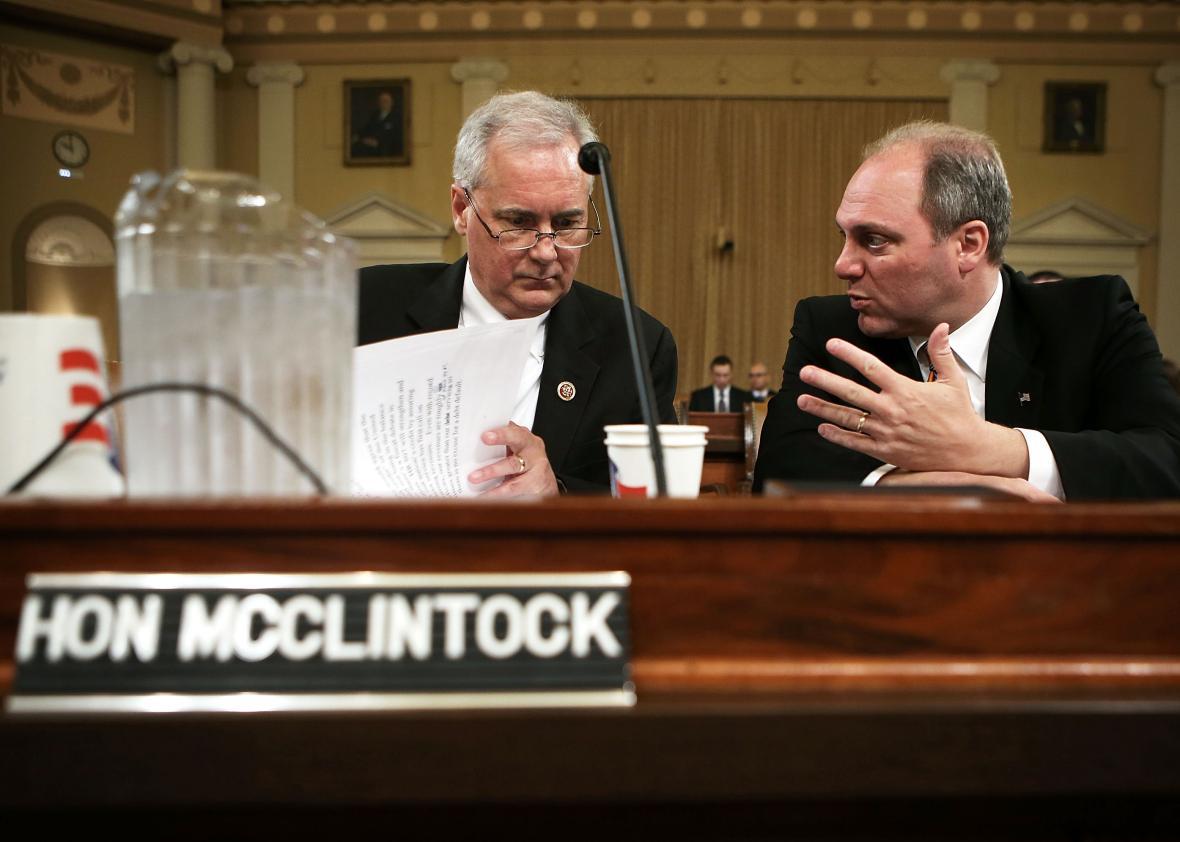The Republican Party has a problem (well, many, but we’re focusing on one today). The U.S. government is set to hit its borrowing limit in about two weeks, and hard-line conservatives in Congress have yet again decided that they would like to threaten a catastrophic national default by refusing to raise the debt ceiling unless President Obama agrees to major policy concessions. The first time the GOP tried this kamikaze tactic in 2011, it worked fairly well, as the White House eventually agreed to major spending cuts to avoid a crisis. But when the party tried to repeat the trick in 2013, the effort ended in acrimonious failure as Obama chose not to negotiate and the public placed somewhat more blame on Republicans than Democrats for the standoff.
Since then, the congressional GOP’s far-right, no-compromise faction has only strengthened, making yet another confrontation over the debt limit seemingly unavoidable. Unfortunately, this means there is at least a slight possibility that, come early November, the U.S. will end up unable to pay all of its bills, thus sending a nuclear shock wave through the economy and the financial markets. In the event that happens, most House Republicans would prefer not to suffer the political blowback. And so they have spent Wednesday passing a bill to give themselves some political cover and make this whole exercise look a bit less rabid.
It’s a flimsy effort. In the event that the U.S. hits the debt ceiling, the “Default Prevention Act,” as the legislation is called, would allow the Treasury to continue borrowing what it needs in order to pay government bondholders and Social Security recipients. This is meant to deflect two obvious criticisms of using the borrowing limit as a bargaining chip. The first is that, since Treasury bonds basically underpin the entire global finance system, a default by the U.S. could trigger a market crisis that would make the collapse of Lehman Brothers look like a gentle autumn stroll through Central Park by comparison, while forever calling into question the full faith and credit of the American government. The second is that, if Washington can’t cut Social Security checks, a lot of elderly Americans are going to be cold and hungry come late fall.
Back in 2013, some Republicans responded to these accusations by claiming that hitting the debt limit wouldn’t actually lead us into such a miserable world of pain. If it happened, they argued that the Treasury should simply prioritize payments to bondholders and Social Security beneficiaries before other expenses. But it wasn’t clear whether that approach was either legal or technically feasible, given how the Treasury Department’s computer system organizes the millions of different payments it makes each day. The House bill is meant to at least deal with the legal half of those issues. It has some precedent; Bill Clinton signed similar legislation during a debt-limit standoff with Republicans in 1996. But, given that President Obama is all but guaranteed to veto the bill—the Treasury has already called prioritizing payments “default by another name“—it will mostly serve as a talking point, a way for Republicans to say, “Hey, we’re not trying to bring on Armageddon here, really.”
But even if the government could borrow to pay bondholders and seniors, crossing the debt limit would still be plenty apocalyptic. Treasury’s computers still might not be capable of prioritizing its obligations, in which case we’d still end up failing to pay some bondholders despite Congress’ intentions. The mere threat of such an accidental default could cause markets to seize. If the Treasury did successfully keep money flowing to its lenders, meanwhile, the government still wouldn’t be able to cover all of its other costs, and thus would be forced to implement massive, immediate spending cuts to other programs, likely dragging the U.S. and probably the rest of the world into a recession.
Playing with the debt limit is insane, full stop. There is no way to make it less insane. That’s why Republicans used it as a threat in the first place. If they’re going to keep playing this game, they might as well just embrace the crazy.
